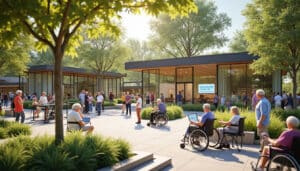Last March, the Good Home Lincs team undertook an enriching trip to Somerset Independence Plus.This visit allowed for a fruitful exchange of experiences and knowledge.Members from Lincolnshire County Council, the district council, and the Lincolnshire NHS Foundation Trust shared intense and inspiring moments.
During these two days, we were warmly welcomed by the Somerset commissioners, operational service directors, and the agents working directly with the residents. The discussions focused on the history, structure, funding, and operations of local services. Part of our team had the opportunity to visit residents supported by independent living officers, thus discovering the concrete impact of their support. This collaboration strengthened our shared commitment to keeping residents safe, warm, and healthy in their homes. The energy and enthusiasm of the Somerset team were a true source of inspiration, highlighting the importance of local services in achieving our shared goals.

Why is it crucial to improve the quality of housing in our department?
The quality of housing plays a fundamental role in the well-being of residents and the dynamism of a department. Well-maintained homes tailored to the needs of the inhabitants contribute not only to physical and mental health but also to social cohesion and local economic stability. By improving the quality of housing, we promote a safer, more comfortable, and more inclusive living environment, allowing everyone to thrive fully.
What are the main current challenges in housing?
The challenges related to improving housing are multiple and varied. Among the most pressing are the lack of affordable housing, the obsolescence of infrastructure, and accessibility issues for people with reduced mobility. In addition, the fight against substandard housing and compliance with environmental standards represent major challenges. Another significant challenge is the management of hoarding behaviors, which requires a sensitive and integrated approach to support the affected residents.
How can we unite our efforts for sustainable improvement?
To achieve a sustainable improvement in housing quality, it is essential to coordinate initiatives among various stakeholders: local authorities, health organizations, community associations, and the residents themselves. Collaboration allows for sharing best practices, pooling resources, and developing strategies adapted to local specifics. For example, the visit of the Good Home Lincs team to Somerset Independence Plus highlighted the importance of experience exchange to strengthen joint actions and optimize available resources.
What local initiatives can inspire change?
Successful local initiatives are paving the way for effective housing improvement. The training on positive thinking and strength-based work, implemented by Somerset Independence Plus, is an excellent example. This approach has celebrated small successes and strengthened residents’ engagement. Furthermore, programs like the home improvement loan from Lendology, shared by the Lincs team, provide financial solutions to help homeowners renovate their properties, thereby contributing to a better quality of life.
What role do networks and partnerships play in housing improvement?
Networks and partnerships play a crucial role in disseminating best practices and fostering collaborative innovation. The Good Home Network is a prime example. This initiative allows decision-makers and practitioners to share effective strategies for reducing the number of substandard housing units and improving housing quality. Partnerships between different regions, such as the one between Lincolnshire and Somerset, enhance the ability of services to meet the varied needs of residents while adapting to local strategic priorities.
How to finance housing improvement projects?
Funding housing improvement projects is often a major obstacle. However, innovative solutions exist, such as home improvement loans or government grants. A study by the IMF highlights the benefits of a silver economy that supports housing renovation and modernization initiatives. Furthermore, partnerships with financial institutions like Lendology provide flexible financing options for homeowners, thus facilitating essential renovation work.
What are the benefits of inter-regional collaboration?
Inter-regional collaboration offers numerous benefits, including the sharing of knowledge and resources. During the visit of the Good Home Lincs team to Somerset Independence Plus, it became clear that both teams share common goals despite their differences in operational models and resources. This synergy not only strengthens local capacities but also adapts proven strategies to different contexts, thereby increasing the overall impact of housing improvement initiatives.
How can we assess the impact of housing improvement initiatives?
To ensure the effectiveness of initiatives, it is essential to establish clear performance indicators and conduct regular evaluations. Collecting data on resident satisfaction, the reduction of substandard housing issues, and the progress of renovation projects allows us to measure the progress made. Additionally, benchmarking with other regions provides valuable insights and adjustments to strategies accordingly, ensuring a continuous improvement in housing quality.
What are the future prospects for housing quality in our department?
The future of housing quality in our department relies on an integrated and collaborative strategy. By strengthening existing partnerships and encouraging new collaborations, we can create an environment where every resident has access to safe, comfortable housing that meets their needs. Initiatives like those from Good Home Lincs and Somerset Independence Plus demonstrate that by uniting our ambitions and efforts, we can meet current and future challenges, thus building a healthier and more harmonious living environment for all.
How can innovative technologies contribute to housing improvement?
Innovative technologies play an increasingly important role in enhancing the quality of housing. Solutions such as housing management applications and smart home systems allow for better control of energy consumption, improve security, and personalize the resident experience. Additionally, sustainable construction technologies contribute to the creation of greener and resource-efficient housing, meeting environmental requirements while providing increased comfort to residents.
What is the social impact of improving housing quality?
Improving housing quality has a significant social impact. Quality housing enhances feelings of security and stability, reduces family tensions, and promotes better social integration. Furthermore, well-maintained homes can stimulate the local economy by creating jobs in the renovation sector and attracting new residents to the department. Finally, these improvements contribute to reducing social inequalities by ensuring that all inhabitants, regardless of their socio-economic status, have access to decent housing that meets their needs.
How to raise community awareness about the importance of housing quality?
Raising community awareness is essential to mobilize resources and promote the adoption of practices aimed at improving housing quality. Information campaigns, participatory workshops, and educational programs can help residents understand the importance of maintaining their homes and encourage them to actively participate in local initiatives. Additionally, sharing successful case studies, such as those conducted by Good Home Lincs and Somerset Independence Plus, inspires and motivates other communities to follow suit, thereby enhancing collective commitment to sustainable housing improvement.
What are the benefits for local authorities of investing in housing quality?
Investing in housing quality brings numerous benefits to local authorities. By improving residential infrastructure, communities enjoy a decrease in public health and social service costs, due to a better quality of life for residents. Moreover, quality housing attracts new residents and investments, thereby stimulating the local economy. Finally, such investments enhance the department’s reputation as an attractive location conducive to personal and professional growth, and support long-term sustainable development goals.
How can public policies support housing improvement?
Public policies play a decisive role in promoting housing quality. By implementing strict regulations regarding construction and renovation, local governments can ensure that safety and comfort standards are met. Moreover, financial incentives, such as grants and tax credits, encourage homeowners to undertake necessary improvements. The engagement of public authorities in public-private partnership programs also facilitates the implementation of large-scale projects, ensuring a coherent and effective approach to meeting the needs of all residents.











